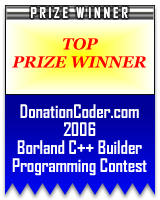IDE
|
Parser generator
|
Interpreter
|
Debugger
|
Test suite
Productions can be tested automatically
Execution
|
C++ code generation (in the professional version only)
|
 Deutsch
Deutsch
| Latest News |
|
11/18/25
Delphi2Cpp 2.6: Delphi Interfaces [more...] |
|
10/28/24
Delphi2Cpp 2.5: Symbol names matching declaration case [more...] |
|
"...Fantastic!!!! ... You have exceeded my expectations and I love your product. We will get a
lot of use out of it in the future for other projects." Charles Finley
xformix 23-02-07
|

I was extremely impressed with your components and tools. Not only extremely powerful but very professionally done and well documented, etc. Really quality work, congratulations
mouser (First Author, Administrator)


